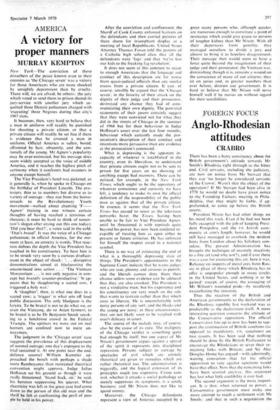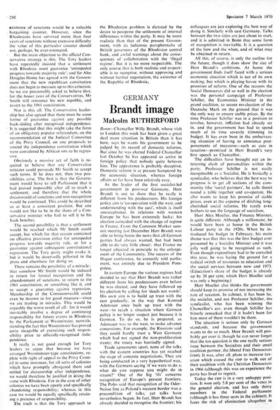FOREIGN FOCUS
Anglo-Rhodesian attitudes
CRABRO
There has been a batty consistency about the British government's attitude towards Mr Smith's Rhodesia right through to the bitter end. Civil servants, including the judiciary, are now on notice from Mr Stewart that they can 'no longer be considered servants of the Crown'. Wasn't that the object of the operation? If Mr Stewart had been alive in 1778 he would no doubt have given notice to the Founding Fathers. meeting in Phila- delphia. that they might be liable, if ap- prehended, to come up before the British courts.
President Nixon has had other things on his mind this week. Even if he had not been fully occupied with the job of keeping Presi- dent Pompidou and the us Jewish com- munity at arm's length. hoWever, he would still have managed to overlook the strident hints from London about his Salisbury con- sulate. The present Administration has brought the technique of masterly inactivity to a fine art (and why not?), and if ever there was a case for exercising this art. here it was. Reliance on imports of metal ores from Rus- sia in place of those which Rhodesia has to offer is unpopular enough in many circles in the United States, and nothing is to be gained—except, of course, the assuaging of Mr Wilson's wounded pride—by needlessly exacerbating the situation.
Thus the reaction of the British and American governments to the declaration of the Rhodesia republic last weekend was as predictable as the declaration itself. A more interesting question concerns the attitude of the Conservative opposition. The official Conservative line up to now has been to sup- port the continuation of British sanctions (as opposed to mandatory, UN. sanctions) on two counts. It has been said that nothing should be done by the British Parliament to encourage the Rhodesians to sever their re- maining links • with Britain; and Sir Alec Douglas-Home has argued—with. admittedly. waning conviction—that for the official opposition to vote against sanctions would have that effect. Now that the remaining links have been severed anyway, this argument has lost what little credibility it ever had.
The second argument is the more import- ant. It is that, when returned to power, a Conservative government must make one more attempt to reach a settlement with Mr Smith: and that in such a negotiation the existence of sanctions would be a valuable bargaining counter. However, since the Rhodesians have survived more than four years of sanctions without excessive difficulty the value of this particular counter should not, perhaps, be over-estimated.
But the main objection to the official Con- servative strategy is this. The Tory leaders have repeatedly insisted that a settlement with Rhodesia must guarantee 'unimpeded progress towards majority rule'; and Sir Alec Douglas-Home has agreed with the Govern- ment that the new republican constitution does not begin to measure up to this criterion.
So we are presumably asked to believe that, for the beaux yeux of the Conservatives, Mr Smith will renounce his new republic, and revert to the 1961 constitution.
Nor is this all. The Conservative leader- ship has also agreed that there must be some forme of guarantee against any possible back-sliding after recognised independence. It is suggested that this might take the form of an obligatory popular referendum, on the recommendation of the Judicial Committee of the Privy Council, on any proposals to amend the independence constitution which were considered by African MPs to be regres- sive.
Obviously a massive act of faith is re- quired to believe that any Conservative minister could persuade Mr Smith to accept such terms. If he does not, then two pos- sibilities arise. The first is that the Govern- ment would have to tell Parliament that it had proved impossible after all to reach a settlement, and therefore that the whole dreamworld of sanctions and non-recognition would be continued. This could be described as at least a consistent position. But one would not like to be in the shoes of a Con- servative minister who had to sell it to his back benches.
The second possibility is that a settlement would be reached which Mr Smith could accept, but which for that reason contained no effective provision either for unimpeded progress towards majority rule, or for a guarantee against subsequent constitutional regression. The Tory party might evoke it, but it would be deservedly pilloried in the press and elsewhere for doing so.
There remains the possibility of a miracle: that somehow Mr Smith would be induced in return for formal recognition and the abandonment of sanctions, to return to the 1961 constitution, or something like it, and to accept a guarantee against regression.
Membership of the Commonwealth could even be thrown in for good measure—since we are trading in miracles. This would be arguably the worst result of all: for it would inevitably involve a degree of continuing responsibility for future events in Rhodesia by the Parliament at Westminster, notwith- standing the fact that Westminster has proved quite incapable of exercising such respon- sibility prior to officially-recognised inde- pendence.
It really is not good enough for Tory leaders to argue that because we have arranged Westminster-type constitutions, re- plete with right of appeal to the Privy Coun- cil in some instances, for all sorts of colonies which have promptly abrogated them and settled for dictatorship after independence, we would therefore be justified in doing the same with Rhodesia. For in the case of other colonies we have been openly and specifically abandoning responsibility; whereas in this case we would be equally specifically retain- ing a pretence of responsibility.
The truth is that the Tory approach to the Rhodesian problem is dictated by the desire to postpone the settlement of internal differences within the party. It may be more realistic than that of the present Govern- ment, with its ludicrous paraphernalia of British governors of the Rhodesian central bank, and awful warnings about the conse- quences of collaboration with the 'illegal regime'. But it is no more respectable. The only course that is both realistic and respect- able is to recognise, without approving and without further negotiation, the existence of the Republic of Rhodesia,



































 Previous page
Previous page